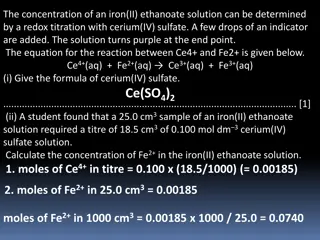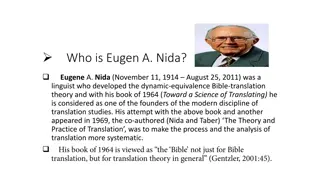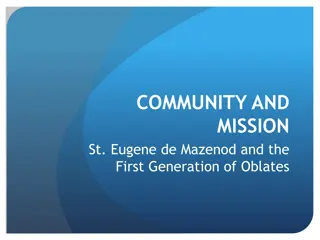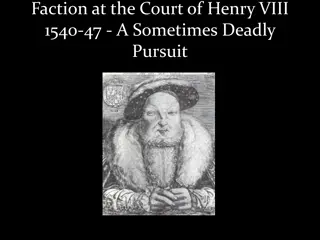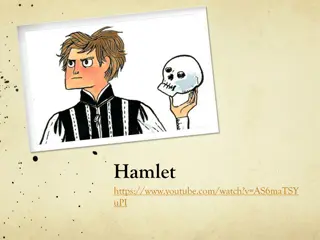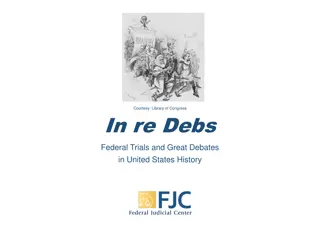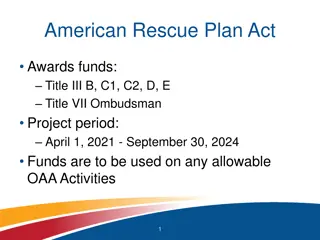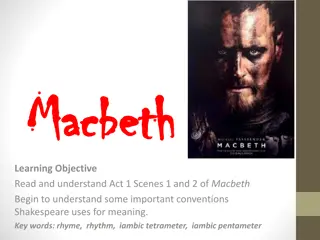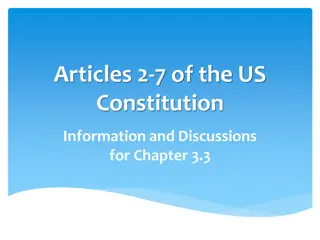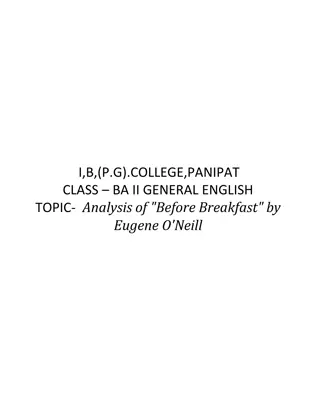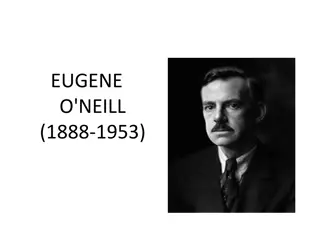Exploring Scenes VII & VIII of 'The Hairy Ape' by Eugene O'Neill
This lecture delves into the pivotal final scenes of Eugene O'Neill's play "The Hairy Ape," focusing on Yank's tragic misunderstanding of the Industrial Workers of the World organization and his quest for belonging. As Yank's desperate search for identity culminates at the zoo's monkey house, he tragically meets his demise, symbolizing the failure to find his place in a mechanistic and self-absorbed society.
Download Presentation

Please find below an Image/Link to download the presentation.
The content on the website is provided AS IS for your information and personal use only. It may not be sold, licensed, or shared on other websites without obtaining consent from the author. Download presentation by click this link. If you encounter any issues during the download, it is possible that the publisher has removed the file from their server.
E N D
Presentation Transcript
Faculty of Education English Department Fourth grade / 2019-2020 Subject/ Modern American Drama Lecturer/ Basma Kamal
WEEK 6 The Hairy Ape: Scenes VII &VIII This lecture revolves around the last two scenes of Eugene O Neill s play the Hairy Ape. But, before continuing reading our scenes we have to refer to scene vi, and how Yank misunderstands the nature of the work of the I.W.W organization. VOICE. [Reading:] I refer to that devil s brew of rascals, jailbirds, murderers, and cutthroats who libel all honest working men by calling themselves the Industrial Workers of the World; but in the light of their nefarious plots, I call them the Industrious WRECKERS of the World! (Scene VI, 37) Of course lacking intelligence, Yank accepts these words as they are. He thinks this social agency is his following target through which he can get revenge from Mildred and her bourgeois class, unaware of how far are these words from reality. This association calls for the workers rights and better conditions, but through peaceful means. Therefore, in scene vii he gets astonished and perplexed when he goes to the agency a month later. Yanks, the stoker, knows only the language of muscles and physical strength. So, he is not able to understand that the I. W.W. office is open for every one and not a secret place. Yank s attitude stirs the secretary s fears :
SECRETARY[With pretended carelessness.] You mean change the unequal conditions of society by legitimate direct action or with dynamite? YANK Dynamite! Blow it offen de oith steel all de cages all de factories, steamers, buildings, jails de Steel Trust and all dat makes it go. (Scene VII, 44) The Secretary backs away from Yank and gives a signal for the men to search Yank for weapons. The Secretary comes up to Yank and laughs in his face. The Secretary accuses Yank of working for the government, he tells Yank he is the biggest joke they have dealt with yet and calls Yank a brainless ape. The Secretary then instructs the men to throw Yank out. Landing in the street he is confused and pathetic. While in scene vii Yank rejects the ape identity, he embraces it again in scene viii as the animal world suddenly presents itself as the last hope of belonging. It is twilight of the next day and Yank looks in on the monkey house at the zoo. The ape inside sits on his haunches and resembles the Rodin s The Thinker, as Yank always behaves when pretending to be thinking.
Yank admiringly talks to the gorilla and complements his strong arms and chest. Yank sympathizes with the Gorilla who seems to want to challenge the whole world by pounding his chest. Yank attempts to be friend the ape. He tells the ape they are similar, as they both caged and taunted. Yank believes he and the ape belong to the same club and calls him brother. Yank releases the gorilla from the cage and approaches to shake the ape s hand. The gorilla springs on Yank, crushes him with its massive arms and tosses him into the cage. Yanks dies in the gorilla s cage as a chorus of monkeys is heard from surrounding cages. Failure to belong is the fundamental to the Hairy Ape. Yank, the tragic hero of the play, is killed due to his inability to identify with the reality of his existence. He is a scapegoat. O Neill implies that twentieth-century society has a great deal to do with Yank s demise. He interprets the values of American individuality to be mechanistic, dimensionless, and totally self-absorbing.
Yank is both a victim and an antagonist of this depersonalizing process. He symbolizes the struggle of modern man within industrial society he cannot break class or ideological barriers, nor create new ones. Yank is the outsider, and eventually the freak at the zoo for people to cage and point at. He acts as interloper between the animal and the divine. Or as Eugene O Neill describes him, a mere cog in the machine. To summarize the stages of Yank s deterioration: First, at the stokehole with his firemen and the world he knows well, Yank feels IMPORTANCE: as he is the leader of the firemen; IDENTITY: he knows who he is and why he is here; BELONGING: The ship, for Yank, is his home; SUPERIORITY: his physical strength and his sense of power result in his feeling that he is better than the other mates. He is the steel that leads to the advancement of the society.
Second, after Mildreds visit to the stokehole: Yank feels a sense of chaos, difficulty, differences, and unconsciousness. He no longer becomes the former character. He questions who is she? And why she describes him as a beast; is he not a human being as she is? His journey to recognition appears to be evident. He is a mere means in the cycle of materialism and a slave in the sight of industrialism, a mere wild animal. At the street, prison, the I. W. W.: He becomes conscious of the dissimilarities between the lower and upper classes, and the vast distance between them. He comes to be sure of his nothingness in the eyes of law, government, or the whole upper class people. He is only a cog in the wheel of the American bourgeois society.
Yank is destined to die in a cage. He is the archetypal of a Neanderthal. He is armed with nothing. No education, no knowledge, no life-experience. He is only good at using his muscles and bodily strength. He works hard at the stokehole, stemming his power from the power of steel and materials. But he never tries to use the human intelligent faculties. To live in such a world of industrial, technological, and scientific revolution, one has to work his mind; one must have tactics of both science and daily life experience.
WEEKS 7 Literary Movements in the Modern Era Before starting our critical analysis of the Hairy Ape, we will revise varied movements appeared in the modern era, next to the main quotations that affect the development and frequency of events in the play as well as the recognition of the protagonist. These artistic and literary movements are: Dadaism, Experimentalism, Expressionism, and Naturalism. Dadaism: It is an international artistic movement centered in Zurich and New York, and flourishing between 1915 and the early 1920s. Dadaism construed artistic work as action, and demanded an end to the isolation of art from life. The movement was an avant-garde in tenor, issuing proclamation s that voiced protests against reason and logic, and demands for the freeing of the individual.
Experimentalism: It is a philosophical belief that the way to truth is through experiments and empiricism. It is also associated with instrumentalism the philosophy that the truth of an idea is defined by how successful this idea is in solving problems. The artists pursue their visions through trial and error. Expressionism: A form of visionary distortion in literature and art, expressionism was a recognizable style from about 1912 until the early 1920s. It depicts the human being in a state of extremity, confronted with feverish dream states or ecstatic in nightmare. Its mannerisms are sometimes garish and shrill, its tone lurid. It is often marked by what Walter Sokel calls a wild, anarchic yearning for irresponsible life and pure sensation . Sokel interprets the wild and futile expressionist desire for life as a sign of the artist s sense of permanent exclusion from the vital center of existence. In this sense, the artist stands in opposition to the complacent bourgeois, who in his stupidity and heartiness does have contact with life.
Naturalism: The naturalist writer frequently depicts a hero who is at the mercy of larger social forces, which represent a cruel, overmastering fate. And the forces of character often seem just as implacable as those of society. The doctrine of Social Darwinism, which saw life as a brutal struggle for survival, had a strong influence on the naturalists. Naturalism is frequently determined to explore, and connect, two senses of lowness: the lower classes, and low manners and morals.
WEEK 8: Modernism and Its Characteristics: It is normally associated with the years from about 1910 through the 1920s, and the following few decades. Modernism aimed to supply a greater intensity to match the bewildering energies of contemporary life. Modernists often had a belief in the crisis of twentieth-century civilization: the world s fall into chaos, decadence, or other dismal, yet dramatically exciting, straits. Moreover, the term modernism is widely used to identify new and distinctive features in the subjects, forms, concepts, and styles of literature and the other arts in the early decades of the present century, but especially after the World War I (1914 1918). The specific features signified by modernism vary with the user, but many critics agree that it involves a deliberate and radical break with some of the traditional bases not only of Western art, but of Western culture in general. The catastrophe of the war had shaken faith in the continuity of Western civilization and raised doubts about the adequacy of traditional literary modes to represent the harsh and dissonant realities of the postwar world.
A prominent feature of modernism is the phenomenon called the Avant-garde (a military metaphor meant advance-guard ); that is a small self-conscious group of artists and authors who deliberately undertake, in Ezra Pound s phrase, to make it new . By violating the accepted conventions and properties, not only of art but of social discourse, they set out to create new artistic forms and styles, and to introduce neglected, and sometimes forbidden, subject matters. Frequently, avant-garde artists represent themselves as alienated from the established order, against which they assert their own autonomy; a prominent aim is to shock the sensibilities of the conventional reader and to challenge the norms and pieties of the dominant bourgeois culture. Hence, modern drama signifies the struggle for self-realization and freedom; the turn from declamatory speech in classical drama to the intimacies of interpersonal exchange which include silence, pauses, and inarticulateness; and the exploration of anxiety and alienation, a feeling of waiting for something inscrutable. Modern drama is experimental, often creating distorted images, gross characterizations, masks, and narrative obfuscations (deception or evasiveness).
The rebellious nature of modern dramatic characters is illustrated by an individual who is breaking away from what is offered as general truth; a uniquely representative figure (representative of humanity, of man) who is in revolt against the representative environment other men have made. The world of action, characteristically, is then the action of others; the world of consciousness is one s own. Out of this separation, and out of its terrible tensions, these men trapped in their rooms make their possible, their exceptionally powerful, drama. Consequently, modernism was the condition in which tradition was found to be lacking and the task of making sense of ourselves and the world could no longer depend on prior authority, religion, or antiquity. It represented massive social, economic, philosophical, and artistic changes brought about by a rejection of the classical formalism (17thcentury) and enlightenment rationalism ( 18thcentury), and was influenced by two revolutions: the 19thcentury industrial revolution and the French revolution. It signifies a turn from deities and moral certainty and towards self-conscious individualism and ambiguity in judgment, values, and interpersonal relations.
At the end, in modern drama, as Bert Cardello contends, the patriarchal relationship between God and the individual soul has been replaced by the adversarial relationship between a person and his/her own psychology, the will to comprehend the self, even as the patriarchal relationship between ruler and subject has been replaced by the adversarial relationship between the individual and society, in the form of society s drive to marginalize all those it cannot or will not homogenize or make similar. Yank, or Bob Smith, is a good illustration of the struggle either between the society, or within himself, and the Hairy Ape is a representative of the varied features of modernism whether in form, subject, or style.
WEEK 9: Main quotations in the Hairy Ape YANK. . . . I belong and he don t. He s dead but I m livin . Listen to me! Sure I m part of de engines! Why de hell not! Dey move, don t dey? Dey re speed, ain t dey? Dey smash trou, don t dey? Twenty-five knots a hour! Dat s goin some! Dat s new stuff! Dat belongs! . . . All de rich guys dat tink dey re somep n, dey ain t nothin ! Dey don t belong. But us guys, we re in de move, we re at de bottom, de whole ting is us! ( Scene I, 8-9) Discuss?
MILDRED[Protesting with a trace of genuine earnestness.] Please do not mock at my attempts to discover how the other half lives. Give me credit for some sort of groping sincerity in that at least. I would like to help them. I would like to be some use in the world. Is it my fault I don t know how? I would like to be sincere, to touch life somewhere. [With weary bitterness.] But I m afraid I have neither the vitality nor integrity. All that was burnt out in our stock before I was born. Grandfather s blast furnaces, flaming to the sky, melting steel, making millions then father keeping those home fires burning, making more millions and little me at the tail-end of it all. I m a waste product in the Bessemer process like the millions. Or rather, I inherit the acquired trait of the byproduct, wealth, but none of the energy, none of the strength of the steel that made it. I am sired by gold and darned by it, as they say at the race track damned in more ways than one, [She laughs mirthlessly]. (Scene II, 12) Discuss?
SECOND ENGINEERYoull likely rub against oil and dirt. It cant be helped. MILDRED It doesn t matter. I have lots of white dresses. (Scene II, 14) MILDRED [About to faint to the Engineers, who now have her one by each arm whimperingly.] Take me away! Oh, the filthy beast! [She faints. They carry her quickly back, disappearing in the darkness at the left, rear. An iron door clangs shut. Rage and bewildered fury rush back on Yank. He feels himself insulted in some unknown fashion in the very heart of his pride. He roars:] God damn yuh! (Scene III, 20) Discuss?
YANK[Springing to his feet and glaring at them belligerently.] Yes, tink! Tink, dat s what I said! What about it? [They are silent, puzzled by his sudden resentment at what used to be one of his jokes. Yank sits down again in the sameattitude of The Thinker. ] (Scene IV, 22) YANK [With abysmal contempt.] Hell! Law! . . . Hell! Governments! . . . Hell! God! . . . I don t give a damn what! I d be square wit her, wouldn t I? Tink I wanter let her put somep n over on me? Tink I m goin to let her git away wit dat stuff? Yuh don t know me! Noone ain t never put nothin over on me and got away wit it, see! not dat kind of stuff no guy and no skoit neither! I ll fix her! Maybe she ll come down again (Scene IV, 23 25) Discuss?
YANKI scared her? Why de hell should I scare her? Who de hell is she? Aint she de same as me? Hairy ape, huh? [With his old confident bravado.] I ll show her I m better n her, if she on y knew it. I belong and she don t, see! I move and she s dead! Twenty-five knots a hour, dats me! Dat carries her but I make dat. She s on y baggage. Sure! [Again bewilderedly.] But, Christ, she was funny lookin ! Did yuh pipe her hands? White and skinny. Yuh could see de bones trough em. And her mush, dat was dead white, too. And her eyes, dey was like dey d seen a ghost. Me, dat was! Sure! Hairy ape! Ghost, huh? (Scene IV, 25) Discuss?
YANK[Frenziedly, from the bottom of the heap.] She done me doit! She done me doit, didn t she? I ll git square wit her! I ll get her some way! Git offen me, youse guys! Lemme up! I ll show her who s a ape! (Scene IV, 27) YANK [With sudden angry disgust.] Aw, hell! I don t see noone, see like her. All dis gives me a pain. It don t belong. Say, ain t dere a backroom around dis dump? Let s go shoot a ball. All dis is too clean and quiet and dolled-up, get me! It gives me a pain. (Scene V, 29) Discuss?
LONG. . . . Yer been lookin at this ere ole affair wrong. Yer been actin an talkin s if it was all a bleedin personal matter between yer and that bloody cow. I wants to convince yer she was on y a representative of er clarss. I wants to awaken yer bloody clarss consciousness. Then yer ll see it s er clarss yer ve go to fight, not er alone. There s a ole mob of em like er, Gawd blind em! (Scene v, 30) Discuss?
YANK[With a jerk of his head back on his shoulders, as if he had received a punch full in the face raging.] I see yuh, all in white! I see yuh, yuh whitefaced tart, yuh! Hairy ape, huh? I ll hairy ape yuh! [He bends down and grips at the street curbing as if to pluck it out and hurl it. Foiled in this, snarling with passion, he leaps to the lamp-post on the corner and tries to pull it up for a club. Just at that moment a bus is heard rumbling up. A fat, high-hatted, spatted gentleman runs out from the side street. He calls out plaintively: Bus! Bus! Stop there! and runs full tilt into the bending, straining YANK, who is bowled off his balance.] (Scene V, 32) Discuss?
YANK. . . He made disdis cage! Steel! IT dont belong, dats what! Cages, cells, locks, bolts, bars dat s what it means! holdin me down wit him at de top! But I ll drive trou! Fire, dat melts it! I ll be fire under de heap fire dat never goes out hot as hell breakin out in de night (Scene VI, 39) Discuss?
SECRETARY[With pretended carelessness.] You mean change the unequal conditions of society by legitimate direct action or with dynamite? YANK Dynamite! Blow it offen de oith steel all de cages all de factories, steamers, buildings, jails de Steel Trust and all dat makes it go. (Scene VII, 44) Discuss?
SECRETARYNo. He isnt worth the trouble wed get into. Hes too stupid. [He comes closer and laughs mockingly in YANK S face.] Ho-ho! By God, this is the biggest joke they ve put up on us yet. Hey, you Joke! Who sent you Burns or Pinkerton? No, by God, you re such a bonehead I ll bet you re in the Secret Service! Well, you dirty spy, you rotten agent provocator, you can go back and tell whatever skunk is paying you blood-money for betraying your brothers that he s wasting his coin. You couldn t catch a cold. And tell him that all he ll ever get on us, or ever has got, is just his own sneaking plots that he s framed up to put us in jail. We are what our manifesto says we are, neither more or less and we ll give him a copy of that any time he calls. And as for you [He glares scornfully at YANK, who is sunk in an oblivious stupor.] Oh, hell, what s the use of talking? You re a brainless ape. (Scene VII, 45) Discuss?
YANK. . . But me, I belong wit embut I dont, see? Dey dont belong wit me, dat s what. Get me? Tinkin is hard [He passes one hand across his forehead with a painful gesture. The gorilla growls impatiently. YANK goes on gropingly.] It s dis way, what I m drivin at. Youse can sit and dope dream in de past, green woods, de jungle and de rest of it. Den yuh belong and dey don t. Den yuh kin laugh at em, see? Yuh re de champ of de woild. But me I ain t got no past to tink in, nor nothin dat s comin , on y what s now and dat don t belong. Sure, you re de best off! Yuh can t tink, can yuh? Yuh can t talk neider. But I kin make a bluff at talkin and tinkin a most git away wit it a most! and dat s where de joker comes in. [He laughs.] I ain t on oith and I ain t in heaven, get me? I m in de middle tryin to separate em, takin all de woist punches from bot of em. . . . Step out and shake hands! I ll take yuh for a walk down Fif Avenoo. We ll knock em offen de oith and croak wit de band playin . Come on, Brother. (Scene VIII, 48) Discuss?
YANK. . . Then YANK moves, groaning, opening his eyes, and there is silence. He mutters painfully.] Say dey oughter match him wit Zybszko. He got me, aw right. I m trou. Even him didn t tink I belonged. [Then, with sudden passionate despair.] Christ, where do I get off at? Where do I fit in? [Checking himself as suddenly.] Aw, what de hell! No squakin , see! No quittin , get me! Croak wit your boots on! [He grabs hold of the bars of the cage and hauls himself painfully to his feet looks around him bewilderedly forces a mocking laugh.] In de cage, huh? [In the strident tones of a circus barker.] Ladies and gents, step forward and take a slant at de one and only [His voice weakening] one and original Hairy Ape from de wilds of [He slips in a heap on the floor and dies. The monkeys set up a chattering, whimpering wail. And, perhaps, the Hairy Ape at last belongs.] (Scene VIII, 49) Discuss?
These quotations describe the journey of Yank from ignorance to recognition of his nothingness in such a materialistic society. Eugene O Neill points out the dilemma of both the upper and lower classes, and how industrialism turns them into means, or marionettes. Both are absorbing whether in hard working, as the firemen and workers, or in artificiality as Mildred and the likes. Each ignores how the other lives. At first, Yank was proud of this industrial revolution and how fast the ship is, unaware of how such an advancement stripped him of his humanity, of life itself. He, and the likes, are cogs in the wheel of industrialism. They are existed only for hard work. Neither the society nor the government and its different institutions care for their rights or better conditions. They are slaves in this mechanistic world. The death of Yank mirrors the insanity of such a world. And how its laws run as it is, paying no attention to the crisis of man, and reflect as well how this conflict will remain for ever, whether inside the individual himself, or with society and other forces. O'Neill dramatizes the American society and the American character in that society in a way that shows him lost and belonging are nothing.
The American society and the social system do not care for their citizens, they are indifferent to their lives, as did the policeman to Yank. The American individual has no room inside his house; he is dismissed because it's not his house anymore. Their only fault is that they were born, so this is the charge as Yank says, and the sentence for this fault is hell. Hell is the only shelter that is offered by society. But O'Neill's characters never give up to their shortcomings, Yank is convinced that he does not fit in this world, so he moves to another world in an attempt to find out his lost identity. In The Hairy Ape O'Neill condemns the new faith in technology. He says that technology has alienated man from past and future. Yank is alienated by technology. Yank can only question himself saying "where do I fit in? It is clear that Eugene O'Neill is a great critic of the modern American society. In the Hairy Ape he presents a very negative view of the states, of the mechanical world, and mechanical America. Where the worker is treated as a hairy ape and where the capitalist class is terribly dehumanized for it has lost its connection with life. America for O'Neill is a device for dehumanizing its citizens, and for preventing change.
O'Neill through the character of Yank presents his reaction to the modern age in America because Yank is every human being. The only answer that O'Neill can find for every human being is death.
WEEK 10: Critical Analysis of the Hairy Ape The Theme of Alienation and Loss of Identity Introduction Life in the United States of America became more difficult and complicated at the beginning of the twentieth century because of the technological developments, schools of thoughts, literary movements and wars which influenced modern man's life. Modern literature and specifically modern drama paid attention to man s relation to himself and to his society. The playwrights tried their hand to reflect the bitterness and suffering of people at that time. Eugene O'Neill (1888-1953) is one of the prominent figures that anchored the basis of the American drama. He tried all the types and styles in writing his plays; he dealt with many important themes and issues of the American society. In fact his themes extended to more than the American people. O'Neill's plays portray the American life, race relations, class conflicts, sexuality, human aspirations, disappointment, alienation and psychoanalysis of American life. He is distinguished among American dramatists for the diversity of his characters throughout his dramatic career. O Neill brought to the stage a richness of detail and psychological depth of portraying the various types ofAmerican characteristics that shape theAmerican identity.
In the Hairy Ape, ONeill exposes an important problem that was common in the world in general and in the America society in particular. It discusses the alienation of the American individual in the modern technological age and the lost identity of those individuals. The Hairy Ape is a one character play which shows the reality and the bad conditions of the American society. The play talks about the reality of the working class. Yank, Paddy, and Long are the central characters with Mildred, the representative of the upper class. Yank is the leader of the firemen on a steamship. Early in the play Yank is strong, powerful and confident of himself and his existence. He glorifies himself and his strength; he resembles himself with the machines that he serves. He thinks of himself as the leader and the prime mover of all machinery, he is the maker of the steel.
Yank's world is shattered and turned upside down by the appearance of a young, pretty women in the stokehole. Mildred Douglass is the daughter of the owner of the stokehole and all the steel that Yank produces. Mildred is curious "to discover how the other half lives", she wants to have a new experience. But when she sees Yank's face and clothes she is terrified and fainted with fear. She is appalled, frightened and cries out "the filthy beast". Mildred does not expect to see a man in this miserable situation. When she sees Yank; she is shocked by his clothes, face, and his hairy chest. At this moment Yank realizes his real status in the society, he is shattered, confused and he has to reconsider his thoughts of himself. He is destroyed psychologically by this experience because it forced him to revaluate himself and his existence in the world. O Neil shows how Yank and his fellow men live, and how they spend their time working day and night without any appreciation from their social system in the first scene. The play dramatizes the American society taking the typical American people. O'Neill's vision of the American society is dramatized through the character of Yank and his fellowmen.
The Character of Yank The Hairy Ape dramatizes the theme of alienation and loss of identity. O'Neill draws a character, Yank, a stoker who lives in the bellow deck in the stokehole of an ocean liner. Yank leaves his home when he was a child, becomes homeless, an outcast; he thinks that he has finally found his warm home which is the stokehole. In the play, Yank thinks that he has found his real place in the world and he can achieve something valuable for himself and for society. Having this feeling, Yank thinks that he belongs to the society and he is important and counted. O'Neill puts the stokers in the bellow deck and at the bottom of the social ladder and even so they are satisfied and convinced in their lives and positions because they think that they do something for society and society is grateful in return. Yank thinks that he and his fellow men are more important and stronger than the others and they can achieve many things for their society, for this he thinks that he belongs and feels proud for his real and valuable identity. Long supports Yank's ideas that they are better guys and they belong, their real home is the stoker and they have no home other than this one.
At this scene Mildred utters three words enough to shatter the world of Yank and enough to shake his faith in himself. When she sees him, she is frightened, appalled and cries out "take me away! Oh, the filthy beast"(Scene Three: 20). Yank at this moment is shattered; he loses his confidence, dignity in front of his friends and his entire world is confused. O'Neill here uses Mildred as a symbol for her class, for the capitalists. She wants to be sincere, "she wants to help them", but in fact, she destroys them especially Yank. "The filthy beast as Mildred calls Yank, loses his fake identity and his respect in front of his friends. Yank realizes that he is no more than a filthy beast in the eyes of Mildred and her class. He knows his real value in society and what is his position in the ladder of evaluation. O'Neill intentionally brings Mildred to the stage though he knows that her role is limited and minimal. Mildred's importance in the play lays in her few words that are intended by O'Neill to awake Yank from his illusion. She was a catalyst to shake Yank from within, to make him realize his reality and his value in society. Mildred's appearance represents an awakening from the lethargy and the dormancy of Yank.
Yank at first has his world, he belongs to the stokehole as he says in the first scene, and he has his identity. But then this identity is dragged forcedly from him because it is not for him, he is abandoned by society. Yank takes his identity from the mechanized world but this sense of belonging is a form of oppression imposed on him. When his world view is changed his power fails him, he can do nothing. The first thing that Yank wants to do after his insult is to "think". He begins to question himself; he tries to think who he is, "Can't yuose seeI'm tryin to tink?" .Then he begins to hate, he falls in hate as he puts it, "I've fallen in hate, get me?"(Scene:4, 22). Yank still clings to the ideas of belonging just because he is in his world, the world of coal and smoke, he is still in the stokehole, he has not moved yet to the upper world. Yank does not know that Mildred is asymbol of her class, later he discovers that if he wants to fix someone then he should fix the whole class. His revenge is not upon Mildred individually but upon her class entirely, the capitalist system. As Long tells him, he should avenge the whole class not only Mildred.
Yank's feeling at this situation of frustration and alienation is symbolic of the feeling of the industrial worker in that contemporary machine age. Yank's personality begins to disintegrate and he feels that he is a prisoner in a cage of steel which he himself produces. In Scene Four Yank starts his journey looking for his identity in the Fifth Avenue, it's the first time for him to see people since months or years. This shows Yanks reality, how he speaks, how he wears and how he behaves with other people. He tries to attack men and women, he just wants to fight anybody but their reactions shock him severely because no one seems to see or hear him. He begins to speak about his glories and his work in the stokehole; Sure! I'm steel and steam and smoke and de rest of it! It moves speed .".
Yank tries to attack people in his way but they seem even not seeing him and unaware of his existence, they ignore him and just passed him, they seem neither to see nor to hear him. This negative reaction of those people annoys Yank so much so he jumps into fury and begins to insult them. Yank is taken to the prison for misbehavior and there O'Neill draws an ironic picture of the American character. Yank is the maker of the steel and it's him "who makes it move, roar" .etc. in the prison he realized that for the second time that the society has rejected him, first by Mildred and then by the people. He still wants to avenge himself from that harsh ungrateful society. He tries to find someone who can understand him in this society. In prison Yank learns about the Industrial Workers of the World (IWW). Yank, after getting out of the prison, joins IWW in an attempt to avenge himself upon Mildred by blowing up the steel company of her father. However, Yank's suggestion is too violent even for the IWW, they think that he is a spy; they just give him another name, a brainless ape, and throw him on the street.
When Yank realizes that his search to belong to somewhere has been futile, and he has been rejected by all segments of society, the wealthy represented by Mildred, the imprisoned in the prison and the representatives of the masses, the IWW, he is confused and bewildered, where should he go and what should he do in this cruel society?. He realizes that he has no place in this mechanized society and this world is not for him. He remembers Mildred's words and applies her theory and goes to the zoo. Yank , in the final scene passes through a desperate phases. He with his desperate identities of filthy beast and hairy ape decides to go to the zoo. In the zoo, he approaches the gorilla. There he sees the real hairy ape and he realizes the ugliness that Mildred has seen in him. He starts talking to the gorilla, he envies it because, he says, gorilla can think of the past and should not have to question its being. He envies the gorilla because it has a place and he does not; the gorilla belongs and he does not as he says.
O'Neill suggests that man becomes equal to animals yet sometimes even the animal is better than man, says Yank to his brother . O'Neill's dramatization of the American character is revealed in this scene. Society is not the only one that rejects Yank, but even the animals do. The gorilla, Yank's brother, also rejects him. The American individuals according to O Neill, have no place neither with the humans nor with the animals. This is the question of the modern American man, he does not fit in society, he cannot live with animals even, so what is the answer of Yank's question? O Neill suggests death to this question; he says death is the only solution to this situation because man cannot live in this industrial monstrous world. But O'Neill adds an ambiguous note to the last direction of the play he says:"And perhaps the hairy ape belongs"(Scene Eight:49).
WEEK 11 The Hairy Ape as an Expressionist Play Expressionism endeavored to express as intensely as possible. The author usually bitterly reacts to the world around him. Expressionistic writers are not optimistic due to their bitter experience in their art and literature. Expressionism art often depersonalizes and dehumanizes it's subject to convey the shock of unfortunately being alive in the cruel modern world. Instead of presenting the world as it is, an expressionist presents the world as it appears to his mind or to his literary character. Expressionism, the name itself suggests that the writer does not use more action on the stage but he uses minimum dialogues, and minimum characters to express his inner bent of mind. The action is less important but he believes in the expression of the characters. It is a dramatic technique which enables a playwright to depict the inner psyche or inner reality of a character. Basically, it is a very difficult task to portray someone's inner mind but through deft use of expressionism one can perform the task very meticulously.
Among all the expressionistic playwrights, Eugene O'Neill is regarded to be the most outstanding playwright. He himself remarked: Expressionism tries to minimize everything on the stage that stands between the author and the audience. It strives to get the author talking directly to the audience The real contribution of the expressionist has been in the dynamic qualities of his plays. They express something in modern life better than did the old plays. The Hairy Ape is a play where we can observe almost all the features of expressionism. The central figure in the play is Yank, representing all the human beings in the modern age. In Expressionistic play, much emphasis has been given on the central figure and minor characters seem to be secondary. Before Yank who is protagonist, Paddy, long, the secretary of I.W.W. is nothing but nameless entities. Yank, the central figure goes to the secretary of the I.W.W. and the other people in its office are equally lacking in individuality. The situation enables the dramatist to focus on the obsession of Yank and what goes in his inner mind. This is nothing but the autobiographical element of the playwright. This play is highly subjective.
There is no development of relationship in the characters. They are only placed side by side, Yank and Mildred met only for a moment but it is enough to havoc with the soul of Yank. All these characters are present for a few moments but they stamp their impression on the audience. The use of dramatic contrivances like exaggerated gestures disturbing colors, sounds and movement was a significant component of the dramatic technique for shaking the audience. The dialogues are frequently repeated not only to emphasize the lack of sophistication but also drive it home to the audience. The expressionistic play is more realistic than the realistic plays because the action rapidly goes on the stage. The topsy-turvy condition of civilization is suggested by the distorted stage setting. The playwright lays focus on the suffering and anguished soul of the central character through 'interior monologue'. Yanks brooding on Mildred's word ' a filthy beast' continues in his mind throughout the play, which creates a feeling of indignation and gives rise to grudge against the sophisticated society. The inner brooding in his mind is the part of the psychological state of mind. It is not the inner reality of the Yank but the disintegration of all modern human beings.
There is a strong condemnation of the capitalism in the expressionistic play. Yank is the representative of the masses and Mildred Douglas is the representative of the classes. Here we can find that how the masses were exploited by the classes. The eighth scene of the play is very crucial because it is the study of Yank's thought process. Yank suffers from inner emptiness, isolation and a feeling of insecurity. In his play, The Hairy Ape, the protagonist of the play, Yank who is in search of his own identity says; Oh! God where do I belong?7 Yank fells uprooted and alienated from the society and tries to take revenge on that rejected society. But then he does not able to take revenge on the society. His thought are not connected with rationality or reasoning. After his disappointment from the whole materialistic world passing from Zoo, he finds a gorilla and think that even animal can realize his grudge against the society. On the contrary, Gorilla crushes him to death and monkey's in the other cages applause for the victory of the animal. It is one of the significant suggestive uses of expressionistic technique.
Eugene O'Neill used the speedy technique of the German Playwright. The action follows a continuously forward movement. Each scene is well-defined. Eugene O'Neill once asserted that he has used the expressionistic technique in the play, but the character of Yank remains that of a man and every one recognizes him as such. The play ends with a note of affirmation at the death of Yank. Thus, the expressionists did not want to represent mankind grappling with outside forces rather they thought to dramatize man's struggle with himself.
WEEK 12 Symbolism in the Hairy Ape The play is an expressionistic representation of human beings in different contexts and class limitations, who are searching for their place in the world. Yank, the main character, is an outcast of society. Yank s condition is reinforced through the heavy symbolism that O Neill chooses to use in the text. Symbols of the ship, the steel, and the white dress are expressionistic means to communicate and indicate the playwright s ideas and intentions behind the play. The Ship The setting of the first part is a transatlantic liner. The liner is not only a voyage ship, but is also a symbol of a wide gulf between the world of the worker and the world of the passenger. The audience experiences the two social spheres, the lower and upper social classes, through Yank and Mildred Douglas, who embody the worker and the aristocratic, over-privileged child. Yank and the firemen work within the cramped and hot stokehole where one hanging electric bulb sheds just enough light through the murky air laden with coal dust to pile up masses of shadows everywhere .
In contrast, on the promenade deck, Mildred and her Aunt are able to see the beautiful, vivid life of the sea all about sunshine on the deck in a great flood, the fresh sea wind blowing across it . Furthermore, the firemen s forecastle workplace where coal is held of the ocean liner is depicted as a cage: The lines of the bunks, the uprights supporting them, cross each other like the steel framework of a cage . The men exist in a symbolically cramped world, void of opportunity and the harsh division of classes in the machine age. The Steel Steel is a key factor in the development of the story. It stands for great power, industrialization, and the repression of the working class. Although Yank exclaims in the first scene that he is steel, the muscles and the punch behind it, (O Neill 1183) he is at the same time closed into a virtual cage of steel created by the ship around him. In his conversation with Yank, Paddy concludes that the men shoveling coal aboard the steam ship are caged in by steel, without sight of land or sea like apes in the zoo (1182). The steel also represents the technology that forces Yank and the firemen into slave-like jobs. They are reduced to work animals, who are caged and abused. O Neill presents this idea in the sixth scene. When in jail, Yank realizes he is trapped and imprisoned in a social identity by companies similar to the one run by Mildred s father.
The White Dress Equally important as the first two symbols in The Hairy Ape is Mildred s white dress. Besides the black and white contrast that it provides between the coal-dusted men and herself, Mildred s white dress has a very strong impact on Yank. Through her ghost-like appearance, O Neill depicts not objective reality, but the subjective emotions and responses that Mildred s dress arouses in Yank. Mildred seems to represent something, to bring something out of Yank that he did not give any attention to before. He repeatedly confesses that she was all white. I thought she was a ghost, she didn t belong, she s new to me . Mildred is different from raw, physical nature. To Yank s consciousness, she transcends nature; she belongs to the spiritual realm. She makes him feel subhuman, at the very core of his being. In the presence of this white apparition he is indeed crushed, debased. He feels inhuman, alienated from society. Due to the environment in which he works and spends his entire time, Yank becomes beast-like as his humanity is covered by dust and coal.
Finally, the alienation that Yank experiences throughout the play, in his pursuit of belonging, is skillfully emphasized by O Neill through symbols like the transatlantic liner, the steel, and Mildred s white dress. The ship serves as a launching place for Yank s quest and also as a line of separation between his world and that of the aristocratic class. The firemen are deprived of human qualities. This irreversible process of degradation takes place in the bottom of the ship, where the men are covered in dust, without any connection with the world outside. On the deck, the image is quite the opposite. The passengers enjoy the sea breeze, ignoring the situation of the people below. The idea of separation is reinforced by the steel. Whether it is the coal shovels that the men use, the bars of the prison, or the bars of the gorilla s cage in the zoo, the steel represents division, and enslavement of the working class. Yank is a direct target of the powerful influence of the steel.
The Hairy Ape is one of ONeills greatest early works, a moving theatrical experience. In depicting Yank s struggle to find his place in the technology-driven world, the author successfully integrates expressionistic ideas and symbols in the play. As long as modern technology continues to take hold of whomever it encounters, society will find more dehumanized, Yank-like individuals who seek to belong. Regrettably, technology created to bring progress and beneficial changes, will inevitably devastate mankind.




